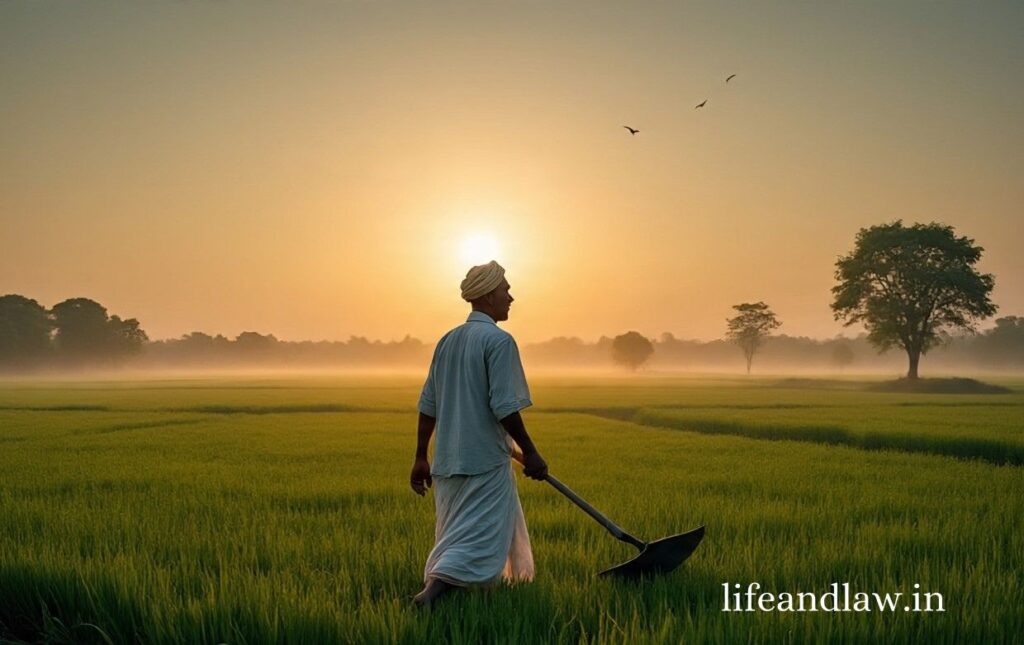Trending

On August 6, we celebrate Farmworker Appreciation Day, a timely opportunity to acknowledge the often-invisible hands who work in fields, orchards, and plantations across India. Every grain of rice and drop of milk is the result of the hard work of millions of agricultural workers—men and women whose stories rarely make headlines but whose contributions are critical to our country’s future.
This site honours their perseverance and spirit while also shedding light on the legal landscape that affects their rights, earnings, and dignity. It is time to honour, protect, and empower those who feed the nation.
In India, where over 45% of the population works in agriculture, farmers are the backbone of rural life. However, unlike land-owning farmers, the majority of agricultural labourers own no land. They are paid on a daily basis, often labour seasonally, and face unpredictable weather, market fluctuations, and arduous physical circumstances.
During harvest season, many farmworkers start their days before dawn and work late into the evening on property they don’t own. For them, the identity of the landowner is often irrelevant—what matters most is that their daily wages provide food for their families. This silent reality reflects the lives of countless others who go unnoticed, unheard, and unpaid.
Despite their crucial role, Indian farmworkers are legally and administratively marginalised. The majority are classified as unorganised workers, which means they do not have formal employment contracts, social protections, or stable income.
Some laws actually exist, at least on paper:
The Unorganised Workers’ Social Security Act of 2008 seeks to offer health, maternity, and old-age benefits.
MGNREGA (Mahatma Gandhi National Rural Employment Guarantee Act) guarantees rural households 100 days of paid employment each year.
States such as Kerala and Tamil Nadu have agricultural labour welfare bodies that provide modest pensions and benefits.
However, in practice, enforcement is inadequate. Legal rights are rarely implemented in practice due to low literacy, bureaucratic barriers, and a lack of legal understanding.
Many farmworkers make less than the legal minimum wage. Payments are frequently delayed or provided in kind (e.g., grain), exposing workers to exploitation.
Pesticide exposure, inadequate sanitation, and long hours under the hot sun all contribute to chronic health difficulties. Few people even don’t have access to primary care or accident compensation.
Women account for about 40% of the agricultural workforce, but they are significantly underpaid and frequently excluded from formal worker recognition. Their contributions—sowing, transplanting, and weeding—remain underestimated.
Interstate migrant farmworkers, such as those travelling from Odisha to Punjab, frequently lose access to ration cards, local government programs, and basic housing, leaving them doubly vulnerable.
Change is slow, but it is happening. The government created the e-Shram portal in 2021 to register unorganised workers, especially farm labourers, and connect them to social welfare programs. As of mid-2025, more than 30 million agricultural workers had registered.
There have also been some promising court interventions. For example, a 2024 Supreme Court decision demanded that MGNREGA salaries be paid within 15 days and that state governments digitise labour records.
Civil society organisations, such as SEWA (Self Employed Women’s Association) and grassroots unions, have played critical roles in raising awareness, providing legal aid, and advocating for accountability.
Farmworkers must be considered as citizens with legal dignity and constitutional rights, rather than just as economic inputs. India requires a specific National Policy on Agricultural Labour that ensures:
Once completely applicable to informal agricultural employment, the Code on Wages will establish enforceable pay requirements.
Access to social security (insurance, maternity benefits, and pensions) regardless of property ownership.
Collective bargaining rights and support of farmworker unions, particularly among women.
Portability of entitlements for migrant workers, such as PDS (rations), health cards, and housing.
Legal reform requires improved public knowledge and political will.
This Farmworker Appreciation Day, our gratitude must extend beyond symbolic gestures. The men and women who work in the fields—sowing, weeding, and harvesting—form the foundation of India’s food economy. However, without decent salaries, safe working conditions, and social
protections, appreciation alone is meaningless. True respect begins with ensuring that their legal and human rights are protected.
Adv. Abdul Mulla, through his efforts www.asmlegalservices and www.lifeandlaw.in, works to create a stronger legal framework that protects and elevates farmworker dignity. His approach emphasises the importance of collaborative legal action, legislative reform, and public awareness in protecting the lives of the nation’s food producers. Because the hands that nourish us must never be empty, and the law must protect them.
Adv. Abdul Mulla (Mob. No. 937 007 2022) is a seasoned legal professional with over 18 years of experience in advocacy, specializing in diverse areas of law, including Real Estate and Property Law, Matrimonial and Divorce Matters, Litigation and Dispute Resolution, and Will and Succession Planning. read more….
Copyright BlazeThemes. 2025